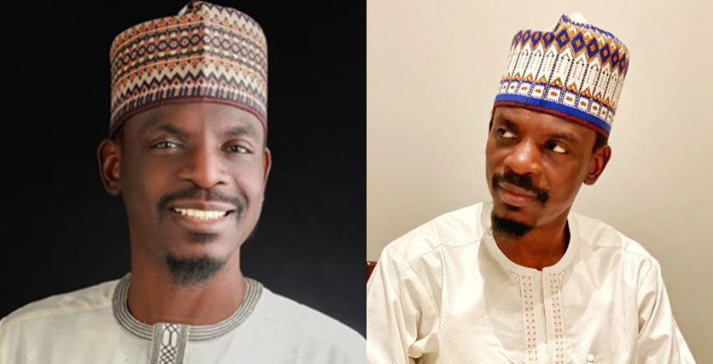
“You Couldn’t Fix a Dot, But Now You Want to Fix the Whole Circle?” – Bashir Ahmad Fires Subtle Shot at Ambitious Politician

In a tweet that has since gone viral and stirred political conversations across social media, former presidential aide Bashir Ahmad took a sharp, if indirect, jab at an unnamed politician who has boldly promised to "fix the country" in a single term. Without explicitly naming the target of his criticism, Ahmad’s words struck with the force of clarity, igniting speculation among Nigerians about whom the tweet was directed at—and more importantly, what it reveals about the growing cynicism surrounding Nigeria’s political landscape.
Ahmad, who served under the Buhari administration and has remained a prominent voice in political discourse, posted the biting commentary on his official X account: "This individual, who couldn't fix a dot within a circle after two full tenures, is now trying to convince us that he can fix the entire circle in just one. Isn't that so insulting to our collective memory?"
The statement, simple but loaded with scorn, instantly triggered a flurry of interpretations. While Ahmad stopped short of mentioning names, many observers believe the post was aimed at a former government official or ex-governor now running for the presidency—or planning to—on a platform of redemption, radical reform, and promises of swift national transformation. The metaphor of “a dot within a circle” left little to the imagination: a clear insinuation that the politician in question had ample time and power in the past but failed to deliver even the smallest of reforms, yet now claims the ability to solve the nation’s deepest problems in record time.
Reactions from the public have ranged from amusement to outrage, with supporters and critics of various political figures dissecting the tweet like forensic analysts. Some lauded Ahmad for voicing what many Nigerians quietly believe—that recycled politicians who failed in past administrations have no moral high ground to promise miracles in new campaigns. Others, however, accused him of hypocrisy, pointing out that he too was part of an administration widely criticized for economic hardship, insecurity, and unmet promises. The conversation quickly escalated into a broader referendum on Nigeria’s political elite and the recurring pattern of unfulfilled pledges from both new and familiar faces.
One user replied, “Bashir, with all due respect, you were in the government for 8 years and the suffering only got worse. If you’re going to throw stones, make sure your own glass house isn’t already shattered.” Another comment read, “He didn’t lie though. Some of these politicians have been governors and ministers and still left their domains in worse shape. Yet every four years, they come back with new slogans and old failures.”
Despite the polarizing nature of the post, what’s undeniable is that it struck a nerve. Nigerians are increasingly wary of flamboyant campaign promises, particularly from those with questionable records. With the country facing serious challenges—from rampant inflation to widespread insecurity and infrastructure decay—many are demanding substance over rhetoric. The tweet, as sarcastic as it was, tapped into a shared fatigue over political repetition and the recycling of narratives that have historically led nowhere.
As Nigeria inches toward another election cycle, the political temperature is already heating up. The race for 2027 is unofficially underway, and social media has once again become the battleground for early political jabs, loyalty declarations, and reputation laundering. Politicians are rebranding, crafting new personas, and rewriting old histories, while critics like Bashir Ahmad are determined not to let them forget the past.
Yet, amid the banter and the jabs, deeper questions remain: Will Nigerians continue to fall for the same old speeches from career politicians? Can anyone realistically promise to “fix Nigeria” in four years, given the depth of the systemic rot? And who gets to judge past performance—former aides like Ahmad or the long-suffering citizens who feel the impact daily?
For some analysts, Ahmad’s comment reflects a shift in political communication, one where sarcasm replaces policy debate, and viral tweets hold more sway than manifestos. But others argue that even sarcastic tweets serve a purpose: they force reflection. They compel citizens to question not just who is speaking, but why they’re speaking now—and what they want us to forget or remember.
In this case, Bashir Ahmad may have done more than fire a petty shot—he may have triggered an overdue conversation about political memory in Nigeria. Too often, the electorate is asked to forget, to move on, to accept the reappearance of yesterday’s leaders as tomorrow’s messiahs. But perhaps tweets like this are subtle reminders to remember who did what, when, and why we shouldn’t be so quick to believe promises from those who had their chance and blew it.
Whether Ahmad’s tweet will lead to greater scrutiny of political aspirants remains to be seen. But in a nation where memory often feels like a casualty of poverty and chaos, even a 280-character nudge can be enough to stir awareness. Nigeria doesn’t just need new leaders—it needs citizens who remember. And sometimes, remembering starts with asking hard questions about circles, dots, and who really fixed what.


